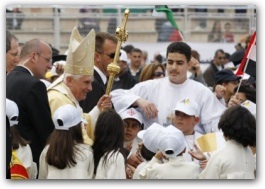Pope packs his own four R's
- FATHER RAYMOND J. DE SOUZA
Respect, religious liberty, resistance to secularization, and reason -- these are the four Rs of Benedicts message to Muslims. He devoted three days to that argument in Jordan, before his focus turns toward the Jews today in Jerusalem.
 |
Pope Benedict, due to arrive in Israel today, concluded his three-day trip to Jordan by encouraging Christians to persevere in faith despite being a tiny and shrinking minority in the Arab world. The papal itinerary for Jordan surprised many, both in length and substance. In 2000, when Pope John Paul visited Jordan ahead of going to Israel, the trip was limited to one day. Benedict spent three days, and included a major address at a mosque built in honour of the late King Hussein of Jordan.
Given the importance of Christian-Muslim relations for the shape of the 21st century, Benedict clearly wanted to use the Jordanian visit to renew his message to the Islamic world. That message has four aspects: mutual respect between Christians and Muslims; religious liberty for all; shared witness to religious values against secularism; and the importance of reason for all believers.
Yesterday, the Pope encouraged Jordanian Christians to find "the courage to build new bridges to enable a fruitful encounter of people of different religions and cultures, and thus to enrich the fabric of society."
Benedict was full of praise for Islamic faith and culture, though he did not issue another apology for his 2006 Regensburg address. The address, which raised questions about the status of violence within Islam, was met with anti-Christian riots throughout the Muslim world.
Some Islamic political parties in Jordan had demanded an apology.
Instead, Benedict insisted that Christians and Muslims must live together in mutual respect and harmony. For Arab Christians, vastly outnumbered by their Muslim brothers, such harmony is a precondition for their continued presence.
Harmony and respect means recognizing religious liberty for all, which Benedict spoke of as a "fundamental freedom" within minutes of his arrival in Jordan.
In both Jordan and the Palestinian territories, religious liberty is generally respected -- but the message here is intended also for those parts of the Arab and Islamic worlds where Christians are persecuted for their faith.
Benedict argues for open religious worship and witness precisely because he thinks of Islam as an ally of Christianity in resisting secularization. Religious practice and the role of religion in public life are much more robust in the Arab world than it is in largely secularized Europe. In choosing to deliver his major address in Jordan at the Al-Hussein bin Talal mosque, the setting underscored the substance of the message.
"Where the opponents of religion seek not simply to silence its voice but to replace it with their own, the need for believers to be true to their principles and beliefs is felt all the more keenly," Benedict said. "Muslims and Christians, precisely because of the burden of our common history so often marked by misunderstanding, must today strive to be known and recognized as worshippers of God faithful to prayer, eager to uphold and live by the Almighty's decrees, merciful and compassionate, consistent in bearing witness to all that is true and good, and ever mindful of the common origin and dignity of all human persons, who remain at the apex of God's creative design for the world and for history."
|
"That task is the challenge to cultivate for the good, in the context of faith and truth, the vast potential of human reason," Benedict argued in the mosque. |
Against secularism, Benedict looks for allies in the Muslim world. At the same time, that invitation cannot lead to an alliance of the Catholic Church with Islamic fundamentalism, much less extremist violence. How to accomplish that? Benedict argues that human reason provides the necessary bulwark against fundamentalism and violence, if religious believers acknowledge that faith cannot demand what is contrary to reason.
"That task is the challenge to cultivate for the good, in the context of faith and truth, the vast potential of human reason," Benedict argued in the mosque.
"And as believers in the one God we know that human reason is itself God's gift and that it soars to its highest plane when suffused with the light of God's truth.... Thus, genuine adherence to religion -- far from narrowing our minds -- widens the horizon of human understanding. It protects civil society from the excesses of the unbridled ego which tend to absolutize the finite and eclipse the infinite; it ensures that freedom is exercised hand in hand with truth, and it adorns culture with insights concerning all that is true, good and beautiful."
Three years ago in Regensburg, Benedict stressed the importance of reason in a provocative question: Does Islam accept that God is reasonable? In Jordan, he implicitly assumed the answer is yes, and invited Jordanian Christians and Muslims to work together for the common good on the shared foundation that faith cannot contradict reason.
Respect, religious liberty, resistance to secularization, and reason -- these are the "four R's" of Benedict's message to Muslims. He devoted three days to that argument in Jordan, before his focus turns toward the Jews today in Jerusalem.
 This is Meaghen Gonzalez, Editor of CERC. I hope you appreciated this piece. We curate these articles especially for believers like you.
This is Meaghen Gonzalez, Editor of CERC. I hope you appreciated this piece. We curate these articles especially for believers like you.
Please show your appreciation by making a $3 donation. CERC is entirely reader supported.

Acknowledgement
Father Raymond J. de Souza, "Pope packs his own 'four Rs'." National Post, (Canada) May 11, 2009.
Reprinted with permission of the National Post and Fr. de Souza.
PHOTO: Reuters
The Author
Father Raymond J. de Souza is the founding editor of Convivium magazine.
Copyright © 2009 National Post

